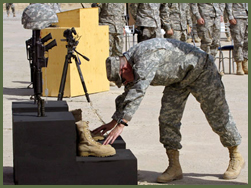26 Troops Dead In August & Cabinet Boycott Grows genre: Just Jihad

UPDATE:
The August 7, 2007 CBS News article cited in this posting indicated that 26 U.S. soldiers had been killed in the last week in Iraq. It is unclear if these 26 deaths all occurred during the first seven days of August. According to the most recent update on GlobalSecurity.org, as of August 6, 2007, 22 U.S. soldiers had been killed in Iraq.
_____________________________________________________
ORIGINAL POSTING:
Just seven days after being told that U.S. troop casualties in July were the lowest seen in some eight months, the number of soldiers lost in August has already reached 26.
While the lower July number has been touted as evidence of the success of the surge, the fact remains that the number of troop deaths (79) in July of 2007 still exceeded the number killed in July of the three previous years. The number of soldiers killed in July of 2006 was only 43.
CBS/AP) The U.S. military tells CBSNews.com that 26 American service members have been killed in action in Iraq in the past week alone, including three soldiers who were killed by a single roadside bomb attack reported Tuesday.
The deaths raised to at least 3,678 members of the U.S. military have died since the Iraq war started in March 2003, according to an Associated Press count.
August has begun with a wave of U.S. troop deaths in Iraq, on the heels of a relatively low death toll in July, which was cited by commanders as an indication that the build-up of American troops in and around Baghdad was reducing violence.
In addition to the alarming number of troop deaths, the Maliki government lost five more Cabinet members, bringing to 17 the total number of ministers who have broken from the government as a result of numerous unmet demands. The news comes on the heels of the recently announced recess of parliament which isn't scheduled to end until early September.
From The International Herald Tribune:
BAGHDAD: The five Cabinet ministers loyal to Iraq's first post-Saddam leader will boycott government meetings, further deepening the political crisis that threatens to swamp the administration of Prime Minister Nouri al-Maliki, two lawmakers said on Monday.
The boycott of Iraqiya List ministers loyal to former Prime Minister Ayad Allawi left the government, at least temporarily, with no Sunni participants. That was a deep blow to al-Maliki's attempt to craft reconciliation among the country's majority Shiites and minority Sunnis and Kurds.
"Our ministers did not attend, because our block has several demands that have not been met. We demanded broader political participation by all Iraqis to achieve real national reconciliation...and an end to sectarian favoritism," al-Azawi said.
The boycott raises to 17 the number of government ministers who have either suspended membership or quit this year.
Despite calls from the Bush administration to allow the troop surge to succeed, all of the evidence coming from the Iraqi government suggests that the country would lack the means to proceed even if the additional troops achieved some level of expanded stability and security.
Unless the sectarian differences can be resolved, it is hard to imagine that the Iraqi's would be able to sustain any of the hoped for progress. Frankly, it appears that the Maliki government may be on the verge of a total collapse...an event that would inevitably signal more unrest and sectarian conflict.
"The government cannot survive all these defections," said Joost Hiltermann, the chief Iraq expert at the International Crisis Group think tank, after the secular Iraqi National List said its four ministers are boycotting cabinet.
"The Shiites and the Kurds don't want to cede power to people they don't trust. But if they don't, there won't be reconciliation. Then all we can look forward to is civil war," he said from Amman.
"Frankly, even with everyone in, there was total paralysis of government. Everyone is waiting for the top leadership to meet and cut a different kind of deal," he noted, with pessimism.
Last week, a report by Stuart Bowen, the US chief inspector of Iraqi reconstruction, painted a damning picture of government failure, and described the effects of corruption as being akin to a "second insurgency".
While the Bush administration proceeds with the surge, virtually every other event in Iraq seems to be deteriorating or on the verge of collapse. Perhaps I'm too pessimistic, but the tea leaves don't seem to support the optimism we're hearing from the president.
Tagged as: al Maliki Government, Cabinet Resignations, Iraq, Sectarian Conflict
Post a comment